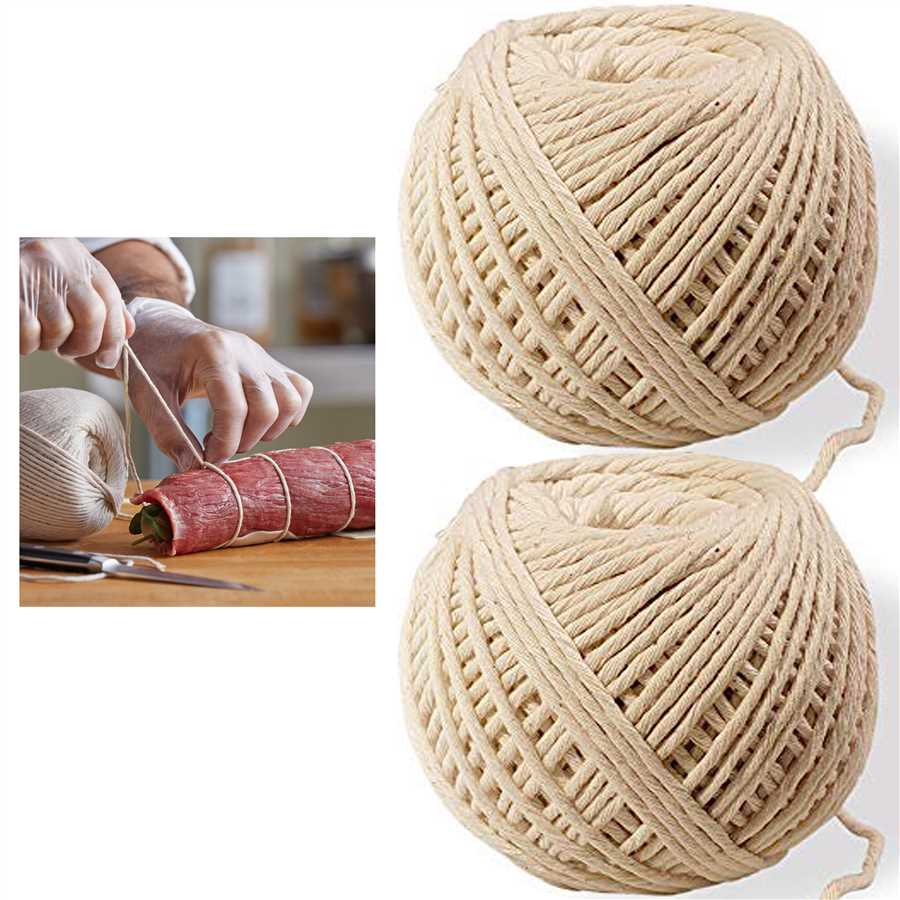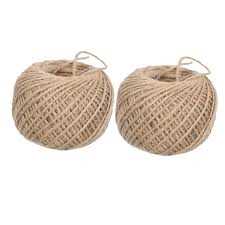

When it comes to cooking, there are various tools and materials that we use to prepare our meals. One such material is twine, which is commonly used for tying up meats and roasts. But can you use jute twine for cooking?
Jute twine is a type of twine that is made from natural fibers found in the jute plant. It is known for its strength and durability, which makes it ideal for various tasks such as gardening and crafting. However, when it comes to cooking, there are some considerations to keep in mind.
Firstly, it is important to note that jute twine is not food-safe. This means that it has not been certified or tested for its safety in direct contact with food. Therefore, using jute twine to tie up meats or other food items that will be cooked and consumed may not be advisable as it could potentially transfer harmful substances to the food.
It is recommended to use twine that is specifically made for cooking or food preparation, which is usually labeled as food-safe or kitchen-safe. These types of twine are made from materials that have been tested and approved for use with food.
Additionally, jute twine may not be heat-resistant enough for cooking purposes. When exposed to high temperatures, jute twine may start to burn or release toxins, which could be hazardous to your health. Therefore, it is best to opt for twine that is specifically designed to withstand high temperatures and is deemed safe for use in cooking.
In conclusion, while jute twine may be suitable for various other purposes, it is not recommended for cooking. It is important to prioritize safety when it comes to food preparation, and using twine that is food-safe and heat-resistant is the best choice for ensuring the health and well-being of you and your loved ones.
What is jute twine?

Jute twine is a type of natural fiber twine made from the jute plant. Jute is a long, soft, shiny vegetable fiber that can be spun into strong threads. The jute twine is commonly used for its strength and durability in various applications.
Jute twine is commonly used in gardening and landscaping for tasks such as tying plants to stakes or trellises, securing bundles of branches, or supporting climbing plants. Its natural brown color blends well with the environment, making it an ideal choice for outdoor use.
Moreover, jute twine is used in arts and crafts projects, such as making macrame or gift wrapping. Its natural texture adds a rustic and eco-friendly look to any project.
It is important to note that jute twine should not be used for cooking or food-related purposes, as it is not food-grade and may contain contaminants that could be harmful if consumed.
In summary, jute twine is a natural fiber twine made from the jute plant, known for its strength and versatility. While it is commonly used for gardening, crafts, and various other applications, it should not be used for cooking.
Properties of jute twine
Jute twine is a versatile and durable natural fiber that is commonly used for various purposes. It has several properties that make it suitable for different applications:
1. Strength: Jute twine is known for its high tensile strength, making it ideal for tying, wrapping, and securing various items. It can withstand considerable weight and tension without breaking, making it a reliable choice for cooking and other tasks.
2. Heat resistance: Jute twine has a good resistance to heat, which makes it suitable for use in cooking. It can be used for trussing poultry or tying up bundles of herbs and spices without compromising its integrity even at high temperatures.
3. Biodegradability: Jute twine is a natural fiber that is biodegradable, meaning it breaks down easily in the environment without causing harm. This makes it an eco-friendly choice for cooking and other uses.
4. Absorbency: Jute twine has the ability to absorb moisture, which can be useful in cooking. It can soak up excess liquids or oils, helping to keep food moist and tender.
5. Versatility: Jute twine is available in different thicknesses and lengths, making it suitable for various cooking tasks. It can be used for trussing, tying, bundling, and more.
In conclusion, jute twine is a strong, heat-resistant, biodegradable, absorbent, and versatile material that can be utilized for cooking purposes. Its properties make it a reliable and practical choice for various culinary tasks.
Can jute twine be used for cooking?
No, jute twine is not recommended for use in cooking. Jute twine is a natural fiber made from the jute plant, and it is commonly used for gardening, crafts, and packaging. While it is strong and durable, jute twine is not designed to withstand high temperatures or direct contact with flames, which makes it unsuitable for use in cooking.
When it comes to cooking, it is important to use materials that are specifically designed for food preparation and are safe to use at high temperatures. Some examples of cooking twines that are commonly used include butcher’s twine and cotton twine. These twines are made from food-grade materials that can withstand heat and direct contact with food.
Using the wrong type of twine in cooking can pose a safety risk, as it may release harmful chemicals or catch fire when exposed to high heat or flames. It is always best to use twines and cooking materials that are approved for food use and follow the manufacturer’s instructions for safe use.
Benefits of using jute twine in cooking
Jute twine is a versatile material that is traditionally used for packaging, gardening, and crafts. However, it can also be used in cooking for various purposes. Here are some benefits of using jute twine in cooking:
| 1. Natural and eco-friendly: | Jute twine is made from natural plant fibers, making it a sustainable and eco-friendly choice for cooking. Unlike synthetic materials, jute twine is biodegradable and does not release harmful toxins when heated. |
| 2. Safe for food contact: | Jute twine is safe to use in cooking as it does not contain any chemicals or dyes that can leach into the food. It is a non-toxic and food-grade material that can be used for wrapping, trussing, or tying various ingredients together. |
| 3. Heat resistant: | Jute twine has natural heat resistance properties, which makes it suitable for cooking applications. It can withstand high temperatures without melting or burning, making it ideal for tying roasts, poultry, or other foods that require oven or grill cooking. |
| 4. Versatile: | Jute twine can be used in a variety of cooking techniques, such as roasting, baking, grilling, and smoking. It can be easily tied around meats, herbs, or vegetables to keep them in place during cooking, resulting in more evenly cooked and aesthetically pleasing dishes. |
| 5. Excellent moisture absorption: | Jute twine has good moisture absorption properties, which can help in retaining the juices and flavors of the food. When used to truss or tie meat, it can enhance the tenderness and juiciness of the cooked dish. |
| 6. Affordable and readily available: | Jute twine is relatively inexpensive and widely available in hardware stores, supermarkets, and online retailers. It is a cost-effective alternative to other cooking twines or strings. |
Overall, jute twine is a practical and natural option for cooking purposes. Its eco-friendly nature, food safety, heat resistance, versatility, moisture absorption, and affordability make it a valuable addition to any kitchen.
Best practices for using jute twine in cooking

When it comes to cooking, jute twine can be a useful tool for many different tasks. Here are some best practices to keep in mind:
- Choose food-grade jute twine: Make sure the jute twine you use is explicitly labeled as food-grade. This ensures that it has been tested and approved for safe use in cooking.
- Use in non-direct heat applications: Jute twine is not suitable for use directly over flames or in high-temperature cooking methods. It is best utilized in applications where it will not come into direct contact with heat sources.
- Avoid tying too tightly: While jute twine is known for its strength, it’s important not to tie it too tightly around food items. This can not only alter the shape of the food but also make it difficult for heat to penetrate evenly during cooking.
- Cut long pieces for easy removal: When using jute twine to tie up roasts or other large cuts of meat, cut longer pieces to make it easier to remove once the cooking process is complete. This will help minimize any risk of the twine getting stuck or left behind in the food.
- Monitor moisture levels: Jute twine can absorb moisture, so it’s best to avoid using it in wet or high-moisture cooking environments. If the twine gets wet during the cooking process, it may affect its performance or integrity.
- Dispose of properly: Once you have finished using the jute twine, dispose of it properly. Do not reuse twine that has been used for cooking, as it may have absorbed oils or food particles that can lead to contamination.
By following these best practices, you can safely and effectively utilize jute twine in your cooking endeavors. Just remember to always prioritize safety and ensure the twine you use is food-grade.
Questions and answers
Can I use jute twine for cooking?
Yes, you can use jute twine for cooking. However, it is important to make sure that the twine you are using is untreated and food-safe.
Is jute twine safe to use in cooking?
Yes, jute twine is generally safe to use in cooking as long as it is food-safe and untreated. It is commonly used for tying roasts and trussing poultry.
What is jute twine commonly used for in cooking?
Jute twine is commonly used for tying roasts, trussing poultry, and securing food items like herbs and cheesecloth. It is a versatile and natural material that is safe for use in cooking.
Where can I find food-safe jute twine for cooking?
You can find food-safe jute twine for cooking at most kitchen supply stores or online. Just make sure to look for untreated twine that is specifically labeled as food-safe.
Can jute twine be used in the oven?
Yes, jute twine can be used in the oven. However, it is important to check the temperature limit of the twine before using it. Some twine may have a lower temperature limit and could be potentially hazardous in high-heat cooking.
Can jute twine be used for cooking?
Yes, jute twine can be used for cooking. It is commonly used to truss poultry or tie up roast meats in order to maintain their shape during cooking.







